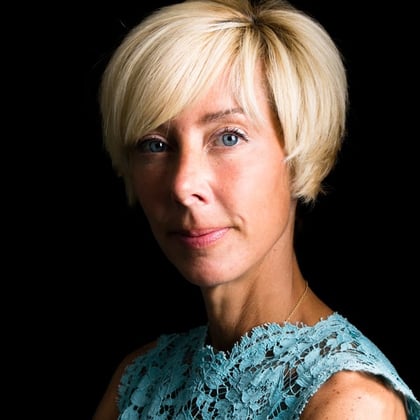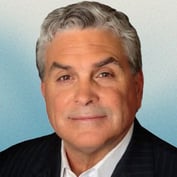Stephanie Pomboy digs around to find risks and opportunities where others fail to tread.
Right now, the founder and president of the economic research firm MacroMavens is forecasting a profits recession, marked by a “huge margin squeeze for the average corporation.”
It will be a significant price squeeze not experienced since the 1970s, as she tells ThinkAdvisor in an interview.
Gutsy and prescient, in 2002 the economic analyst predicted the housing bubble’s imminent inflation long before others saw it. In 2007, she foresaw the worst financial crisis since the Great Depression.
Last year, Pomboy warned of a stock market crash.
Her profits recession forecast is based on fact: Input costs have been “outpacing the ability [of corporations] to pass them on,” she argues.
Indeed, “the relationship between input costs and consumer prices is so integral to the outlook for the stock market,” she says.
Pomboy contends that the Federal Reserve’s monetary and fiscal stimulus during the worst of the coronavirus pandemic did little to increase economic activity but instead, did much to create “a massive bubble in financial assets,” which now, as a result of the stimulus withdrawal, is starting to deflate, she says.
In the interview, Pomboy, whose clients include investment firms, mutual funds and hedge funds, among others in and out of financial services, maintains that today’s primary risk is that the Federal Reserve will “belatedly ransack inflation.”
Diving beneath the surface of existing trends, she analyzes economic and financial market data to find and interpret subtle signals for shifts.
That is, she seeks what’s not priced into the market, then forecasts the implications.
Pomboy launched MacroMavens 20 years ago after a decade working with Ed Hyman at C.J. Lawrence and ISI Group. She picked up an economics degree from Dartmouth College in 1990.
She produces two weekly reports covering risks and opportunities, one for institutional investors, the other for retail investors.
Her podcast is “The Super Terrific Happy Hour” (“business, finance and economics, with a side-order of skepticism”), which she cohosts with Grant Williams.
ThinkAdvisor interviewed Pomboy on May 17. She was speaking by phone from her base in West Palm Beach, Florida.
She noted that no one else seems to be forecasting a profits recession because Wall Street “take[s] whatever the companies say as gospel until they say otherwise. No one is looking ahead.”
Here are highlights of our interview:
THINKADVISOR: What are you discerning from your analysis of the economy and financial markets?
STEPHANIE POMBOY: There’s the very real prospect of a profits recession. Yet nowhere on Wall Street is anyone forecasting this. It seems to be it’s a no-brainer.
The relationship between [corporate] input costs and consumer prices is so integral to the outlook for the stock market.
And right now, the input costs have been far outpacing the ability of [corporations] to pass them on.
What are the implications?
I’m looking at the difference between the two and seeing an implied margin squeeze for the average corporation. We’ve never seen a squeeze this huge other than in the 1970s.
I’m talking about real pressure on corporate profit margins.
Will there be indications of a profits recession on current earnings reports?
Just because input costs are going up faster than corporations’ ability to pass [them] along, doesn’t mean this immediately hits current earnings reports. It takes a while for it to show up in the actual earnings numbers.
So it will take time for the commentary from companies to filter into Wall Steet strategists’ forecasts.
Why is no one else forecasting a profits recession, as you say?
No one is looking ahead. They just take whatever the companies say as gospel until they say otherwise.
Wall Street focuses only on what the companies say. They wait for them to say [for example], “Here’s our guidance for the next quarter.”
What’s the primary risk that you perceive?
The Fed is going to belatedly ransack inflation. This is the main thing that has the stock market anxious.
You’ll see the stock market continue to come under pressure if the Fed continues to move rates up.
Most people are saying, “They’ll raise rates, and the economy will have this, sort of, soft landing. It will slow, and everything will be perfect.”
I think that expectation is just fantastical, to put it nicely.
Can the Fed trigger a recession by raising interest rates?
It remains to be seen whether we’re in a recession right now or not. In the first quarter [real GDP growth fell at a rate of 1.4%].
If we do that again in the second quarter, even by the barest margins, technically we will have accomplished the definition of a recession.
The Fed got religion about inflation right when it was about to take care of itself anyway because consumers already ran out of the money with which to sustain their spending on everything at higher prices.
It’s kind of a classic Fed blunder.
What’s the economy’s state of health?
The idea that the Fed can raise rates without precipitating a recession is rooted in a misapprehension about how strong the economy really was to begin with.
When you take out the amount of money that was handed to consumers to spend, a different picture [emerges] about the inherent strength of the economy and the ability to withstand the stimulus withdrawal.
But the consensus has been that the economy is strong. How do you reconcile that with what you’re saying?
One of the things the Fed and Wall Street have underestimated is the degree to which the strength of the economy that we saw in the last couple of years was entirely a function of the monetary and fiscal stimulus, which totaled roughly $10 trillion.
We put $10 trillion into the economy, but GDP grew only $2.3 trillion. With inflation, you come up with $600 billion real growth.
It’s sad how little actual increase in economic activity we got for all that stimulus.
What we did get was a massive bubble in financial assets, which is now starting to deflate because we’re taking the stimulus away.
You write that the asset bubble is now deflating and “we can expect spending to slow materially, squeezing margins and depressing hiring.” Please elaborate on consumer spending.
For so long, real wealth and “phantom wealth” have been the tail wagging the dog of the economy. When there’s a positive wealth effect, consumers ramp up spending and have a higher tolerance for accepting higher prices.
[Just so], when the reverse happens and their net worth starts to decline, they pull back on spending and on their willingness to abide higher prices across the board.
And this is happening now?
We’re getting into that situation now, in part, because policy suggests that energy prices, for sure, and food prices, maybe to a lesser extent, are going to remain elevated.








 May 23, 2022 at 04:37 PM
May 23, 2022 at 04:37 PM












 Copyright © 2024 ALM Global, LLC. All Rights Reserved.
Copyright © 2024 ALM Global, LLC. All Rights Reserved.